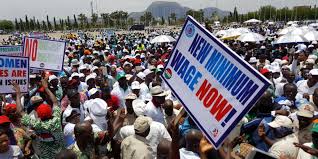Agriculture
Agric Credit: Songhai Farms Boss Makes Case For Farmers
The Farm Operations Co-
ordinator of Songhai Rivers Farms Initiative, (SRI), Mr Tammy Jaja, has said that inability of farmers to access government agricultural funds was capable of making farmers produce below expectation for the nation’s food needs.
Jaja stated this while speaking recently in a lecture presented at the University of Port Harcourt, during the 2nd Niger Delta Conference and the 1st induction ceremony of 21 members into the Institute of Natural Resources, Environment and Sustainable Development, (INRES).
He explained that without access to such agricultural funds, farmers, especially the subsistence ones that dwell in the Niger Delta region would not be able to produce large quantities of food stuff.
The three-day event with the theme: “Optimizing the Utilisation of Natural Resources of the Niger Delta and Managing Flood-induced Pollution, Jaja said that it was time for the government to become more sensitive to the plight of poor subsistence farmers in the Niger Delta.
According to him, the essence of setting up agricultural funds would be defeated if rural farmers find it difficult to access such funds for the development of their farms.
“There is no point setting up agricultural funds without allowing poor rural farmers in the Niger Delta to have access to them.
“No Single farm can feed the entire nation, and so our rural farmers must gain access to agriculture funds which give financial support to their farming activities,” he said.
While lamenting the bureaucratic procedures that characterize farmers’ access to funds, he advocated for the elimination of such a process, noting that they have become some of the reasons why many people do not want to go into farming.
Pointing out other challenges faced by subsistence farmers in the Niger Delta, he said non-engagement of key stakeholders in decision-making, limited research, top-bottom approach to policy making, environmental issues, improved seedlings, land tenure system and lack of training for farmers among others were the major challenges faced by the farmers.
The SRI Farm Operations Coordinator further explained that despite the fact that farmers were the key stakeholders in agriculture, they do not receive agric training and do not even know how to source for agricultural funds.
“The agricultural sector has other challenges which include absence of research and development, environmental constraints, the frustrating land tenure system of 1978, gender issues in agriculture, non-implementation of research findings, poor farmers’ linkage with the market as well as other numerous challenges” he said.

Commissioner, Katsina State Ministry of Environment, Mr Jamilu Danmusa (2nd left) in a handshake with representative of Food and Agriculture Organisation, Mr Rabe Mani (2nd right), at the opening of 2014 seasonal rainfall prediction follow-up workshop in Abuja. With them is consultant and team leader, extension, Federal Ministry of Agriculture and Rural Development, Prof. Tunji Arokoyo (left) and President, Global Climate Technology, Dr Shrikant Jagtap. Photo: NAN
Agriculture
FG, Ogun Distribute Inputs To 2,400 Farmers
Federal Government and the Ogun State Government, on Wednesday, distributed farm inputs to farmers as part of effort to address food security challenge.
The State Director, Federal Ministry of Agriculture and Food Security, Dr. Toyin Ayo-Ajayi, during the flag-off ceremony of Inputs Redemption Under The National Agricultural Growth Scheme-Agro Pocket (NAGS-AP), in Ogun State, disclosed that beneficiaries of the gesture were primarily rice, maize and cassava farmers across the State.
Ayo-Ajayi commended the Ogun State Government for partnering with the government at the centre for the effort in supporting farmers with inputs that would bring about yieldings for local consumption and likely exportation.
She noted that government is supporting rice, cassava and maize farmers with inputs worth N212,000; N189,000 and N186,000 respectively.
The Permanent Secretary in the State Ministry of Agriculture, Mrs Kehinde Jokotoye, who represented the Commissioner in the Ministry, Bolu Owotomo, stated that traditional farmers are critical in food production, hence the need to encourage and support them with inputs that would bring about desired results during harvesting.
Owotomo said: “Let us make good use of this opportunity, so that the success of this phase will make farmers benefit more from the state and federal governments of Nigeria.”
Earlier, State Coordinator, Federal Ministry of Agriculture and Food Security, Dr. Oluwatoyin Ayo-Ajayi, appreciated the present administration for partnering with the federal government for the initiative, adding that the programme is designed to support farmers at the grassroots level in cassava, rice and maize with inputs such as, seeds, pesticides, herbicides and fertilizers, to boost their production and enhance their livelihood.
Agriculture
Niger Allocates 10,000 Hectares For Smallholder Farmers
The Niger State Government has mapped out 10,000 hectares of farmland in Gbapo Community of Katcha Local Government Area of the State for smallholder farmers to benefit from the state government’s agricultural intervention programme.
Two thousand out of the 10,000 holders of the farmlands have already received inputs.
At a flag-off ceremony in Yinti Village, the facilitator of the programme, Shinkafan Nupe, Malam Idris Usman Makanta, assured the farmers of increased distributions to the mapped-out ten thousand (10,000) farmlands if farmers respond positively.
He explained that the commencement of the two thousand is to measure the positive response of farmers before obtaining full-scale support.
Malam Makanta stated that this initiative aligns with the farmers’ initial commitment through Niger Foods, whose mission is primarily geared towards establishing efficient and profitable agricultural businesses to support the present administration of Governor Mohammed Umaru Bago’s quest to boost agricultural productivity in the state.
He also commended Niger Foods for their steadfastness and resilience in the effective implementation of the input financing scheme.
Makanta reiterated the commitment of the State Governor in making judicious use of the arable land in the state.
Shinkafan Nupe, therefore, urged the farmers to support the Governor by using the inputs wisely so that the dream can be actualised.
Agriculture
GO-CARES: Gombe Empowers 573,429 Farmers, Entrepreneurs
The Gombe State Government has empowered a total of 573,429 farmers and entrepreneurs under the 4th phase of the GO-CARES programme.
The programme was officially flagged off by Governor Inuwa Yahaya in another major step towards alleviating poverty and supporting the state’s vulnerable populations.
The Governor, while inaugurating the disbursement in Akko Community of Akko Local Government Area, restated his administration’s commitment to the welfare of vulnerable citizens in the state.
He was represented by the Commissioner for Budget and Economic Planning, Salihu Baba Alkali, who is also the Chairman of the Steering Committee on GO- CARES implementation.
“The 4th phase of GO-CARES will directly and indirectly impact a total of 573,429 citizens across the state. Of these, 152,429 individuals will benefit directly through cash transfers, livelihood grants, agricultural inputs, and operational grants to small businesses”, he stated.
The Governor added that, “421,000 people will be indirect beneficiaries through infrastructural projects such as classroom blocks, healthcare facilities, WASH services, and rural infrastructure projects like culverts and drainages”.
Yahaya, reaffirmed his commitment to ensuring that the state’s most vulnerable citizens are not left behind in the state’s development.
According to him, “Earlier this year, on June 25, 2024, we flagged off the distribution of improved seedlings, fertilizers, and herbicides to less privileged farmers in Malam Sidi, Kwami Local Government Area, signaling the commencement of the 4th phase implementation of GO-CARES under Result Area 2”.
The Governor reiterated that these initiatives have had a significant impact on the livelihoods of beneficiaries and the overall agricultural sector.
He explained that, “Today’s ceremony marked the simultaneous launch of activities under all three GO-CARES Result Areas for the 4th phase. These areas include: State Cash Transfer Grants: 2,500 direct beneficiaries; Labour Intensive Public Works: 2,700 direct beneficiaries; Livelihood Grants: 10,000 direct beneficiaries; and Basic Services: 405,000 indirect beneficiaries”.
-

 Politics3 days ago
Politics3 days agoProposed States Creation: Youth Leader Lauds Nass Over Obolo State Inclusion
-

 News3 days ago
News3 days agoTreasury Bills Attract N3.22trn From Investors
-

 Sports3 days ago
Sports3 days agoNPFL: Remo Narrowly Beat Pillars 2-1 To Maintain Lead
-

 News3 days ago
News3 days agoAfDB Dissatisfied With $210m Nigeria Agro-Industrial Zones Project
-

 Niger Delta3 days ago
Niger Delta3 days agoDiri Unhappy Over Poor State Of Public Schools
-

 Editorial3 days ago
Editorial3 days agoNew Federal Varsity In Ogoni
-

 News3 days ago
News3 days agoN70,000 Minimum Wage States’ Salaries Rise By 90% To N3.8trn
-

 Oil & Energy4 days ago
Oil & Energy4 days agoWAPCo Commences Four-Week Pipeline Maintenance

